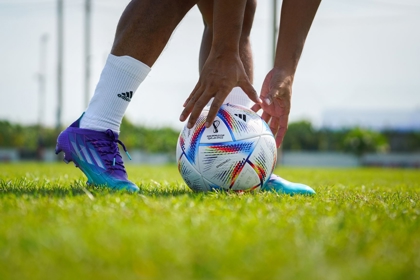As medical professionals often say, there are many proven wellbeing benefits to exercise and sport, but what of the struggles?
As the World Cup kicked off for another summer, I wanted to consider how football culture directly interplays in wellbeing, with a reflection on the wider psychology and sociocultural interplay behind this.
In this article, I reflect on five key struggles to be aware of this world cup season; of the darker side of football and competitive sport, and, arguably, living. Providing a practical takeaway for each point, with a learning to keep generally well away from the pitch.
1. Match day uncertainties and chronic stress
Survival instincts are utilised for competitive sports by those competing and spectating. As the two ‘tribes’ anticipate a ‘fight’ for the ultimate prize, adrenaline levels are biologically programmed to be high.
As I wrote in my article, The Realities of Stress, acute stress can be viewed positively; short term elevations of cortisol that boost adrenaline can be beneficial to focus our attention. Chronic elevations, on the other hand, are less helpful, and more significant challenges arise when we match this to an environment that is constantly changing as each new change acts as a fresh stressor.
In the football, uncertainty may take many forms, from working with new teammates, or playing different teams, to being placed in foreign environments that lack the structures of usual weekly routines.
How do teams playing, or watching, manage this?
Stoicism and mental agility
Throughout modern day psychotherapy, some of the tactics we use are simple reiterations of the wisdom of our ancient civilisations, namely Stoicism and mental agility. For any new problem, rather than worrying on the hypotheticals, focus needs to be placed on individual accountability and what can be done now.
What truly is within or outside control? A new injury cannot be magically fixed to enable a player back on the pitch, but a new substitution and strategy to play may work in a different way. If we can build a dialogue to approach the problem early, or plan for the problem ahead, we may feel in greater agency for our day on the field. Whether that is on the pitch or working in our office.
2. The role of locker room panic and the pressure to perform
- Skilled focus,
- attention to detail,
- and wanting the best outcome.
These traits can be seen as hugely beneficial as both a footballer and a clinician. As a recovering perfectionist myself, I hold my empathy across for the darker side of this focus; that of anxiety and harsh self-criticism.
Fear of failure, at its worst form, can lead to complete procrastination and self-sabotage- stepping out of training or freezing at that free kick. Equally, perfectionism can be an isolating place as an individual may believe they need to carry more. The ‘should’s that unfold do not harbour an ethos for team working, which is so imperative in both football and life.
Reframing, compassion, and a learner’s mindset
Routing where one’s backdrop for perfectionism may originate from is a helpful first step to counter its most damaging effects, by reframing the situation.
For example: if someone holds perfectionist traits, and they hold a core belief that they should ‘fix all problems’, this could be reframed to note that they need a role in facilitating others, and play out in one’s mind the difference this thought may make in one’s working approach.
Compassion is also imperative to foster a learner's mindset, to fail better each time. Jamie Carragher noted an important statement in a recent discussion on Sky sports of recognising “extraordinary talent, but an ordinary person”. The role of compassionately separating the talent from the person may harbour talent development, as it then becomes an externalised skill that can be shaped, rather than representative of whom a person is, which perpetuates self-critique.
3. Biased selection meets social rejection
Social injustice can take many forms, and the football stadium, like many other arenas of sports, highlights these.
Rio Ferdinand’s documentary series aims to focus on three key areas within football where stigma and discrimination awareness is expanding:
- mental health,
- race,
- and sexuality.
Whether biased selection, insults thrown, or overt rejection, we cannot separate here the human from the sport, or one protected characteristic from another. Stigma and discrimination will have obvious impacts on sporting performance, and we know from working in healthcare that at the root of this inequality causes worse healthcare outcomes, and even increased mortality.
Furthermore, as 2022’s World Cup was controversially held in Qatar, the awareness of inequality is brought even further to the fore, with issues amassing around sexuality, approaches to human rights, and concerns surrounding the number of deaths associated to the creation of Qatar’s stadium.
Assumption awareness, increasing connection, and curiosity
As a society, we have the astounding ability to collaborate and ostracise, in seemingly equal measure. The learning from this area is to keep learning, to not assume, and to gain voices at the table which are diverse and inclusive so true equity can be understood.
Equity, Diversity, and Inclusion (EDI) needs to be thought about continually and in a non-judgemental and facilitative way, so that transformative action can be taken. From a personal perspective, this may be as small as challenging your set beliefs and spending time with people that are different to you. Take a step out from your silo, look at different articles to those pushed in front of you on social media by invasive algorithms, and be curious to why decisions are made in the way they are. Ask yourself, who are we harming?
4. Losses and upset, wins and superstition
People of us think about bereavement semi-often, yet, many of us feel challenged to talk about loss. As a hierarchy sets itself into play, it can feel impossible to discuss any places where a loss is incurred.
I’m not comparing a lost football game to a bereavement, but the variety of emotions that trigger when we experience a loss in a game may echo, and mean that we feel in no place to analyse what has occurred. Angry, disconnected, upset. Conversely, when a team wins, there can be a less analytical and more superstitious mindset set to whether or not a team was experiencing some form of luck. This all can be hard as, ultimately, we are not feeling good whether we lose or win.
Perspective and reflection
Gary Neville noted in a Sky Sports interview, “perspective’s a really important thing as a football player”. Arguably, this statement applies both to individuals and teams alike.
I spoke above about a learner's mindset, but further to this, we need to ask simple questions and manage expectations, too. This is where the role of a team being led by a coach, rather than a manager, is a significant semantic reframe; the rule to good football, or life, is not to direct like a manager, but to reflectively guide like a coach.
5. Risk in mind at the final time
“Criticism will affect the family as much as them” – Jamie Carragher.
This quote was focusing more on a perfectionist's mindset (as above), but expanding this to the overall culture set up in any space can propagate itself into unknown angles. I wrote, in another article, on the cautions of toxic masculinity, which encompasses many angles of my this current article, but I wanted to take a further systemic lens. There have been significant reports of increased rates of domestic violence in line with football matches. The London School of Economics have found that these associations most likely link rooted to alcohol use around the time of games, with peaks noted also to emergency departments of those admitted with alcohol related injuries.
Ultimately, from all angles, individuals may engage this football season in behaviours that are less helpful to them, that begets outcomes that are harmful.
Safety first
For this learning, experience in motivational interviewing tells me that cracking down on fans being able to drink at football matches will serve no purpose. Lessons from dry-January can be taken all year round, however, and raising public awareness to the circuits we get caught up in when we drink alcohol regularly can, indeed, be beneficial.
If we know that there is a whole month dedicated to stay dry and eat less, it prompts the question of “where does the line of enjoyment end and the territory of harm start?”
Being curious around your relationship with certain behaviours can open up new considerations and lifestyles. What are the benefits and costs of drinking, or cutting down on drinking? What may have helped you cut back in the past? What are some options to assist you achieving a healthier relationship with alcohol in the future?
A community can be a support also, and Alcoholics Anonymous warrants a note here.
Separately, for any individual who may be vulnerable this football season to any form of aggression and domestic violence, stepping away can be a journey starting with curiosity to notice harm. As you would guide any friend, question how you would look at the situation if you were supporting someone else. make a record for yourself, privately stored, of what may be evolving, keep safety first in mind; Make a safety plan, know your exits, have a bag packed with your essentials, including ID, and read the government guidance on support for domestic abuse.
References
Rio Ferdinand Article and Reference to Documentaries- https://www.theguardian.com/football/2022/nov/07/rio-ferdinand-interview-racism-england-world-cup-documentary
Alcoholics Anonymous https://www.alcoholics-anonymous.org.uk/
![Umbraco.Cms.Core.Models.MediaWithCrops`1[Maudsley.Web.Models.PublishedModels.Image]](/media/2064/camila-tooley.jpg?quality=100&rnd=133619945621500000)

